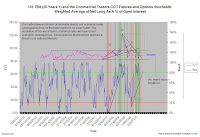Centralized control views the capital markets as a cookie jar. No one will notice if we take just one more cookie. Markets are enticed by these cookies via leverage over the short-term, but capital flows and the secular trends that define them are not interested in short-term and short-sighted solutions (treats).
QE to infinite assumes that confidence is static. History clearly tells us it is not. Capital has a very good feel for the number of cookies left the jar. When the number reaches a dangerous level, it will seek or flee into the perception of safety; it will flee into the safety of the U.S. dollar, US treasury bonds, gold, and stocks. When its fears that the jar is empty, capital flows will adjust and seek a new, singular safe haven that will serve as a bridge from the old to new system.
Eric,
I firmly believe that the Fed via swaps financed the ECB for today's intervention in the euro under the assumption that if they did not a second down $1000 would occur. This action guarantees "QE to Infinity." Gold is going to and above $1650.
JimBreaking News Alert
The New York Times
Thu, May 20, 2010 -- 4:15 PM ET
-----
Stocks Close With Sharp Losses; Dow Falls 3.6%, S.&P. 500 Down 3.9%
Stocks on Wall Street fell sharply on Thursday as uncertainty
over Europe and financial regulation continued to weigh on
the market and disappointing new economic data dampened
optimism about recovery.
The Dow Jones industrial average fell 376.36 points, or 3.6
percent, in preliminary figures, and broader indexes fell
farther, with the S. & P. 500 losing about 3.9 percent and
the Nasdaq composite 4.1 percent for the day.
Companies that rely on business in overseas markets took a
hit, as industrial, materials, energy and financial stocks
were among the sectors that traded lower on Wall Street.
Crude oil prices fell, as did those of industrial metals like
copper. The yield on the 10-year treasury note fell to its
lowest level this year, 3.21 percent.
Read More:
http://www.nytimes.com?emc=na

















































